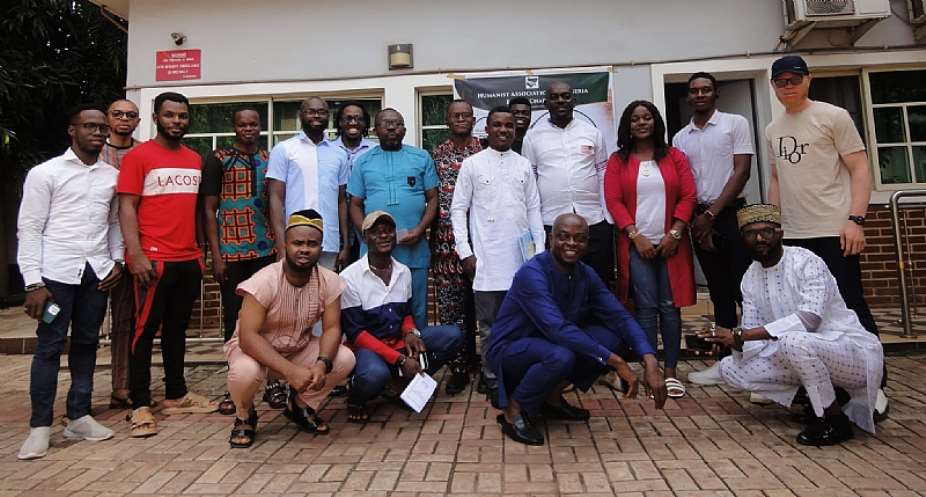Humanist ceremonies are performances that enable atheists, agnostics, humanists, and nonbelievers to mark occasions and milestones in their lives in ways that are consistent with their values. They provide alternatives to religious celebrations of weddings, naming, funerals, etc. Unlike religious events, humanist ceremonies are not performed in the name of any deity or some supernatural entity. They are celebrations of humans, not superhumans, nature, not supernature, this life, not afterlife, the here and now, not the hereafter. Humanist ceremonies are unique, flexible, personal, and tailored to suit the needs of the individual(s) in question. There is no particular script or format to follow.
Incidentally, the overwhelming impression is that religion has a monopoly on ceremony; that people must observe or celebrate milestones in their lives in a religious way. Many people are of the view that nonreligious life stance is boring, monotonous, and devoid of ways of marking occasions. This mistaken idea is pervasive, especially in southern Nigeria. Christianity is dominant in this part of the country. Apart from the southwest which has a significant Muslim population, the rest of the region is a Christian stronghold, and Nigeria's Bible belt. There are adherents of traditional religion, but more of those who practice an admixture of Christian and traditional beliefs. Thus people perform ceremonies in a Christian religious way. They wed or do naming, bury the dead in the name of the christian god, or some deity.
Due to enormous pressure to profess Christianity, most nonbelievers in the region are in the closet. Millions of people pay lip service to religion. They nominally identify as Christians and theists, seldom as atheists or agnostics. People are compelled to pray at meetings, state functions, school assemblies, and in offices and markets. Those who refrain from participating in religious worships and fellowships are regarded as demonic. They call them children of the devil, cultists, Satanists or devil worshippers. Nonbelievers are forced to mark occasions in their lives as religious believers. Religious family members oppose the organization of humanist funerals for their late relatives. Religious believers hijack the funerals and ensure that they bury nontheistic members in a religious or theistic way. In most cases, religious family members claim that these nonbelieving relatives did not totally renounce religion or that they converted shortly before they died.
However, the situation is beginning to change. Many nonbelievers are becoming assertive of their intent to wed, name their children or have their funerals in non-religious ways. Many Nigerians want to celebrate or mark milestones in their lives without God or religion. For instance, a popular traditional ruler in Imo state, and an ex-catholic priest, Dr. Enyeribe Onuoha, has willed that his funeral would be secular. Like many humanists, he is concerned that his family members may not abide by his wish. So, a lot of work needs to be done to educate the religious public and get them to abandon their prejudices and biases against humanism and humanist ceremonies.
To this end, the Humanist Association of Nigeria is devoting this year to humanist ceremonies. The association is organising workshops in different parts of the country to correct misconceptions about humanism and humanist ceremonies. Ignorance and mistaken ideas are often at the root of the hostility of believers towards non believers and nonreligious celebrations. The events will be an opportunity to inform Nigerians that humanist ceremonies exist and that there are alternative ways to celebrate weddings, naming, and funerals. These workshops will serve as a forum to identify and train humanist officiants.
The Enugu chapter of the Humanist Association organized a workshop in July. It was the first workshop on humanist ceremonies in the country. There were over 20 attendees at the event. There are plans to hold other workshops in Calabar, Port Harcourt, Abuja, Lagos, Jos, and Markurdi in the coming months. At last, it is exciting to know that humanist ceremonies have come to stay and be a part of the Nigerian culture and society.
Leo Igwe is a board member of Humanists International, UK





 Minority will expose the beneficial owners of SML, recover funds paid to company...
Minority will expose the beneficial owners of SML, recover funds paid to company...
 Prof. Opoku-Agyemang has ‘decapitated’ the NPP’s strategies; don’t take them ser...
Prof. Opoku-Agyemang has ‘decapitated’ the NPP’s strategies; don’t take them ser...
 Abubakar Tahiru: Ghanaian environmental activist sets world record by hugging 1,...
Abubakar Tahiru: Ghanaian environmental activist sets world record by hugging 1,...
 Prof. Naana Opoku-Agyemang will serve you with dignity, courage, and integrity a...
Prof. Naana Opoku-Agyemang will serve you with dignity, courage, and integrity a...
 Rectify salary anomalies to reduce tension and possible strike action in public ...
Rectify salary anomalies to reduce tension and possible strike action in public ...
 Stop all projects and fix ‘dumsor’ — Professor Charles Marfo to Akufo-Addo
Stop all projects and fix ‘dumsor’ — Professor Charles Marfo to Akufo-Addo
 Blue and white painted schools will attract dirt shortly – Kofi Asare
Blue and white painted schools will attract dirt shortly – Kofi Asare
 I endorse cost-sharing for free SHS, we should prioritise to know who can pay - ...
I endorse cost-sharing for free SHS, we should prioritise to know who can pay - ...
 See the four arsonists who petrol-bombed Labone-based CMG
See the four arsonists who petrol-bombed Labone-based CMG
 Mahama coming back because Akufo-Addo has failed, he hasn't performed more than ...
Mahama coming back because Akufo-Addo has failed, he hasn't performed more than ...
